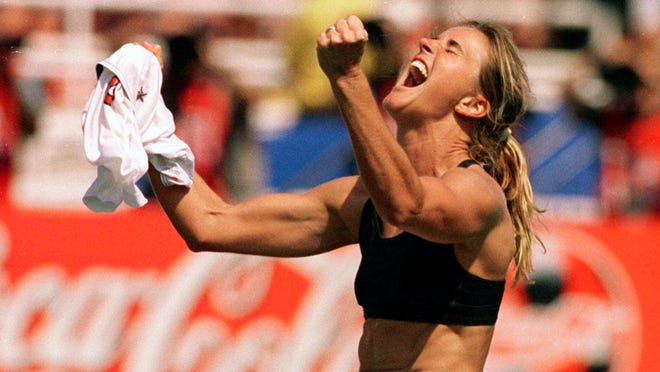CARSON, Calif. — Seated at a table with two teammates and microphones at the home of Major League Soccer’s LA Galaxy, Megan Rapinoe smiled and took compliments about the new color of her hair, at that point in late June still a few days away from announcing her impending retirement from playing soccer.
Alex Morgan nodded at the mention of the work she, Rapinoe and several U.S. women’s national team players current and past put in to gain more equality in pay and other areas, and how those legal battles and wins helped female players in other parts of the world as well.
The two are the faces of women’s soccer in the United States as the national team gets ready for the FIFA Women’s World Cup in Australia and New Zealand, which starts Thursday. But Rapinoe is leaving the game, and one if not several younger teammates are about to become bigger names in soccer as the World Cup unfolds.

In 2023 there is a new energy around women’s soccer. This time, it’s not just the World Cup that is providing increased exposure. Women’s soccer in the U.S. is bigger than ever, with a thriving professional league full of talent, a new league with more first-division teams and opportunities on the way next year, recent legal settlements for millions of dollars and equal pay with males for all female athletes who represent the U.S., and another World Cup over the next few weeks that will once again shine a spotlight on the American women.
This doesn’t even include the hundreds of thousands of soccer-playing girls nationwide who will benefit from all of the advances the sport has made over the past few years. The pay-to-play structure for elite club soccer remains prohibitive, or the numbers would likely be higher. But soccer is still a gateway for young players to a college education and for a few, professional and international competition and/or a career in the sport.
Twenty-four years after former U.S. player Brandi Chastain tore off her jersey and celebrated the winning penalty kick in front of a full house and TV audience at the Rose Bowl in the 1999 Women’s World Cup Final, such an expression of joy surely wouldn’t be met with so much controversy and criticism. Yet ever since it happened, the sport has reached new heights for women and inspired a generation of girls.

That doesn’t mean there isn’t work still to be done in equality and growth of the game. But women’s soccer is in a better place all over the world, as the U.S. isn’t the only country to level the playing field.
“So coming away with each player making at least $30,000 (for playing in the World Cup) is huge because a lot of federations, usually that money goes to federations and those players don’t see any or much of that money. With U.S. Soccer we have in our contract equal prize money between the men and the women, which is a shared pot. And that’s the only federation in the world that does that,” Morgan said. “So we’re very happy that we fought for that and were able to attain that. Now it’s up to FIFA and other federations to do their part.”
This week, however, FIFA’s president Gianni Infantino said national federations will receive the $30,000 payments and FIFA will be relying on individual federations to ensure that money gets to the players. There is no guarantee every player will get her money, in that case.
Morgan also mentioned that the number of hotel rooms and charter flights for both the men’s and women’s teams is equal.
“We’ve made tremendous strides in our game. And you know, we’ll continue to do that. But for that reason, I think this is going to be just as every World Cup is, the best World Cup,” Rapinoe said. “By far you’re gonna see the best product on the field. And that’s because players are going to be able to be put in a position to actually do that and just focus on the game and go out there and provide the entertainment everybody wants.”
The U.S. team has led the way in fighting for equality, and international players have taken notice and been inspired. In New Zealand, Gabi Rennie had to play on boys’ teams growing up. But times have changed in the ASU player’s homeland, and more girls are playing the sport with more development for the women’s national teams.
“I think their success on the world stage has really helped advocate for women’s game. And I think it’s undeniable that they’ve helped grow equality in the game. So a lot of people give a lot of respect to those girls,” Rennie said.
Read more:ASU’s Gabi Rennie set for Women’s World Cup debut in native New Zealand
Good vibes at Media Day
On June 27, the U.S. women’s national team gathered for news conferences and one-on-one interviews in Southern California for an event in advance of the Women’s World Cup. While the gains made in the fight for equality were part of the topics of the day, many of the questions players took were about being mothers, their own paths to the national team and what another World Cup title would mean to them.
Julie Ertz, who after pregnancy, giving birth and maternity leave earned a spot on the World Cup team, said the growth of resources available is “astronomical” over her 10 years with the national team. The Mesa native is on her third World Cup team.
“Being able to play in college is why I’m able to then kind of play for the national team. So obviously, it’s very clearly important, especially for the next generation and continuing that fight,” Ertz said. “And I think where we are now in just knowing the growth of women’s sports makes it like almost kind of an empowering time to play.”
Sophia Smith, the goal-scoring whiz with a bright present and future, made reporters laugh when showing just how much younger she is (22) than most of them, saying older teammates expect her to know who Tupac (the late rap star) is, discussing how she’s never used a CD player and how they’re trying to show her websites other than Google.
Smith is also part of the changing face of the national team, which is more ethnically diverse than it’s ever been for the World Cup.

“This team, it’s the best players in the country. It doesn’t matter what you look like. Race, I don’t think has anything to do with anything. It’s just if you’re good enough, you’re good enough. And I would like to believe that that’s what’s happening at youth levels, too,” Smith said. “It is great to see more diversity on this team, because it shows young girls who look like me that they can do it too. And yeah, it doesn’t matter what you look like, if you’re the best you can be on this team.”
Every player, it seemed, was asked about her reaction to the call from national team head coach Vlatko Andonovski to let each one know they’d made the World Cup team. And U.S. Soccer produced an eight-minute video in which celebrities welcomed each player individually to the team, another sign of the team’s widespread popularity and support.
Expansion:Pathway to pro soccer for women widens with creation of USL Super League, 2 Arizona teams
Rest of world catching up to U.S.
The U.S. isn’t a lock to win its fifth World Cup in the nine tournaments, including 2023. The Americans have never finished lower than third place, but it’s generally accepted that other teams around the world, mainly from Europe, can press the U.S. for the trophy.
Jessica McDonald, a Phoenix native playing for the NWSL’s Racing Louisville FC, appeared in the 2019 Women’s World Cup for the U.S. and has also played professionally abroad. She’s seen the rise of the women’s game in other places.

“If you look at the United States … we’ve had more privilege and resources over the years in comparison to the other countries. And now these other places have the opportunity, they have the resources, and with soccer being the number one sport worldwide in every other country but the United States,” McDonald said. “So now, with resources being focused on solely one sport elsewhere, that was kind of an easy adjustment for these other countries simply because they have that natural ability already as football-minded people, whereas the United States, we’re playing catch-up in that area simply because soccer is not an American sport.”




